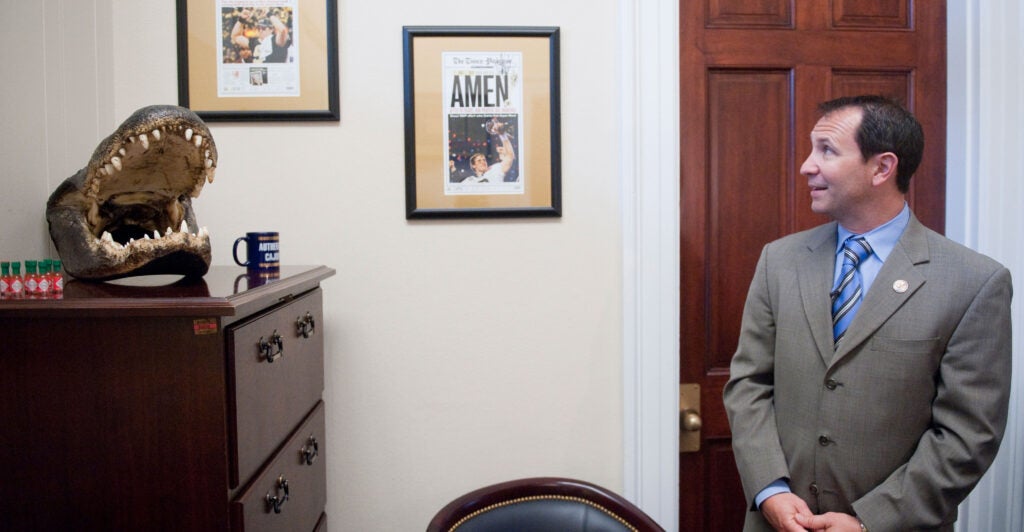Louisiana families are on the cusp of a transformative opportunity for their children—but that opportunity is in jeopardy of being swamped.
Last year, Louisiana Gov. Jeff Landry signed into law the Louisiana Giving All True Opportunity to Rise (“LA GATOR”) Scholarship Program, which has the potential to be a legacy-defining achievement.
The policy gives Pelican State families the freedom and flexibility to customize their child’s education. Families can use their GATOR scholarships to pay for private school tuition, textbooks, curricular materials, special-needs therapy, and more.
As the name implies, the intent of the GATOR Scholarship program was to expand education choice to the families of all K—12 students in Louisiana.
Landry made that intent clear when the bill reached his desk, exclaiming that the LA GATOR Scholarship Program “puts parents in the driver’s seat and gives every child the opportunity for a great education.”
However, unless the Louisiana legislature appropriates the funding for the GATOR scholarships, very few Louisiana children will get access to a better education.
On Monday, the Louisiana House Appropriations Committee is set to consider whether to fully fund the GATOR Scholarship Program or leave some stuck on a waiting list. More than 39,000 students applied for a GATOR scholarship, which Landry called an “astounding number” that shows “just how vital the GATOR Scholarship is to Louisiana families.”
However, Landry requested $93 million for the program, which is barely 1.1% of Louisiana’s $8.2 billion in K—12 spending. That’s only enough to serve about 12,000 students, fewer than one-third of the applicants, or about 1.8% of K—12 students.
That’s a far cry from serving “all” Louisiana students.
The GATOR scholarships are more cost-effective than traditional district schools. The scholarships range from about $5,200 to $7,600, depending on household income, compared with more than $15,000 per pupil spent on average at Louisiana’s district schools. Students with special needs can receive scholarships worth about the state average for all students, with and without special needs.
Getting access to a GATOR scholarship could be life-changing for a child, but the Louisiana Illuminator recently reported that state legislators are “likely to eliminate funding for Gov. Jeff Landry’s signature education initiative,” which would “scuttle one of Landry’s most significant legislative accomplishments since taking office last year.”
The article reports that Senate President Cameron Henry, a Republican from Metairie, supports removing $50 million from Landry’s $93 million GATOR Scholarship request. That request included $43 million for the roughly 5,300 students who had been participating in the now-defunct Louisiana Scholarship Program—meaning that it would be unlikely that a single new student would be able to receive a scholarship.
If the state legislature fails to fund the Louisiana GATOR Scholarship Program, it would derail a lifeline for tens of thousands of children in need of a better education—kids like Jah’Derrick, who was profiled on Sunday at NOLA.com:
Jacqueline McCardie wants badly to put her grandson in a new school.
The public elementary [school] that 11-year-old Jah’Derrick attends is crowded and outdated, and the baby-faced fourth grader says he gets bullied.
But McCardie, 62, is a single guardian on a fixed income, so her only real option [without a GATOR scholarship] is the local public school in Winnfield, the small town in north-central Louisiana where they live.
Although the article states that McCardie “isn’t sure where she’d spend” a GATOR scholarship, given that there are no private schools in her rural parish, there are more options for rural families than most people realize.
As a Louisiana Department of Education spokesperson observed, there are online courses and tutoring available statewide, as well as homeschool co-ops and a growing number of microschools.
Moreover, the number of private schools and other learning options in rural areas is not static. Education choice policies like the GATOR scholarships increase demand, which leads to an increase in supply.
As my Heritage Foundation colleague Matthew Ladner and I observed in a 2023 report, private options in rural areas in Arizona and Florida increased dramatically after those states adopted robust education choice policies.
In Florida’s 30 rural counties, the number of private schools grew from 69 to 120 in the two decades since enacting school choice, with private-school enrollment in those counties more than doubling. Likewise, the number of scholarships awarded to private-school students in rural Arizona more than doubled in the past decade.
Louisiana has a chance to lead, to show that it values educational innovation and trusts families to make the best choices for their children.
But leadership requires action. The time to act is now.
For the sake of Louisiana families, and especially the children whose futures hang in the balance, the GATOR Scholarship Program must not be allowed to get stuck in the swamp.
If Louisiana lawmakers really want to give all the opportunity to rise, they must ensure that all Louisiana students can get access to the GATOR scholarships.

An alligator head was among the decor in the lobby of then-Rep. Jeff Landry’s office in the House Cannon House Office Building 14 years ago this month on May 3, 2011. Landry is now the state’s governor and supports the Louisiana Giving All True Opportunity to Rise (“LA GATOR”) scholarship program. (Bill Clark/Roll Call via Getty Images)
















